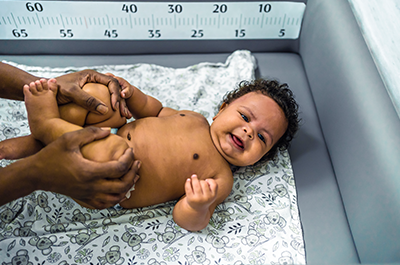Within the last three decades, the rate of asthma in children—especially young African American boys—has skyrocketed. Experts believe it’s likely due to a combination of genes and changes in our environment, meaning some people have certain genetic variations that are more susceptible to factors like viral infection, air pollution and stress.
In fact, a recent study conducted at Henry Ford Health that included national collaborators has identified two genetic variations common in African American children that are linked with severe, non-allergic asthma (or asthma that isn’t triggered by allergens like pollen or dust).
This study found that 14% of African American kids have these genetic variations,” says Christine Johnson, Ph.D., M.P.H., a research scientist at Henry Ford Health. “The variants are associated with a risk for severe asthma, but further studies are required to understand how this occurs.
How Environment Influences Your Genes
This doesn’t mean that every person with these genetic variants will develop severe asthma, says Dr. Johnson. The variants may or may not be “triggered” depending upon someone’s environment. For example, living in an urban area with increased pollution, experiencing high stress, having a poor diet, living in a family where someone smokes—all of these factors may increase the likelihood that someone with this genetic pattern will develop asthma.
“Socioeconomics also play into this,” says Dr. Johnson. “Those living in areas with higher amounts of concentrated air pollution tend to be in a lower socioeconomic bracket. Same with diet. Even things like breastfeeding versus bottle feeding and having a vaginal birth versus a C-section—these are also related to socioeconomics and can likely indirectly influence someone’s likelihood of developing asthma if they already carry this genetic variant.”
The Future Of Diagnosing & Treating Childhood Asthma
In the future, doctors may test for these genetic variations. “Most of the medications used for asthma—like steroids and inhalers—were developed for allergic asthma,” says Dr. Johnson. “But these treatments may not work as well work for someone who has non-allergic asthma. So if kids can be tested for these variants, doctors will be able to identify which type of asthma your child has and prescribe medications that will most benefit them.”
This would also allow doctors to make recommendations to help prevent the onset or severity of asthma. For example, they may pinpoint the environmental factors to avoid and have high-risk children examined more often. Or if RSV is going around or COVID-19 cases are spiking, doctors may recommend that high-risk children wear a mask, because they might not be able to fight off respiratory infections as well.
In short? Knowing whether a child is predisposed to severe asthma can help parents make choices that will help their child be the healthiest they can be—and the identification of these two genetic variants is just the beginning.
To find a pediatrician at Henry Ford Health, visit henryford.com or call 1-800-436-7936.
Christine Johnson, Ph.D., M.P.H., is Chair of the Department of Public Health Sciences at Henry Ford Health.



